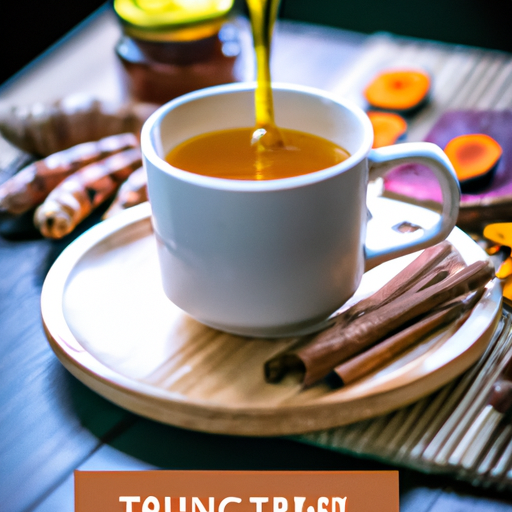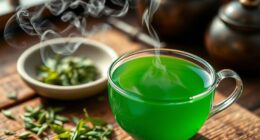Turmeric tea, the golden elixir that promises to soothe inflammation, has taken the health world by storm. But does it really live up to the hype? Prepare to be amazed as I delve into the scientific evidence surrounding this ancient remedy.
Turmeric, a spice commonly used in Indian cuisine, has a rich history in traditional medicine. Its active compound, curcumin, is believed to possess potent anti-inflammatory properties. From alleviating joint pain to reducing chronic inflammation, the claims surrounding turmeric tea are impressive.
But what does science have to say? Research studies have explored the effects of turmeric tea on inflammation, revealing promising results. These studies suggest that curcumin may inhibit inflammatory pathways and reduce the production of inflammatory molecules.
If you’re ready to harness the potential benefits of turmeric tea, I’ll guide you on how to prepare it for maximum impact. But first, let’s explore other potential health benefits, possible side effects, and expert opinions on incorporating turmeric tea into your healthy lifestyle.
Get ready to embark on a journey of discovery as we uncover the truth behind turmeric tea’s inflammation-fighting powers!
Key Takeaways
- Turmeric tea is a popular remedy for inflammation and has gained attention in the health world.
- The active compound in turmeric, curcumin, is believed to have potent anti-inflammatory properties.
- Turmeric tea has been studied for its effects on various inflammatory conditions, such as arthritis and inflammatory bowel disease.
- The effectiveness of turmeric tea in reducing inflammation may depend on dosage and timing of consumption.
The History and Traditional Use of Turmeric in Medicine
Did you know that for centuries, people like you have been using turmeric in traditional medicine to treat a wide range of ailments, including inflammation?
Turmeric, a vibrant yellow spice derived from the Curcuma longa plant, has a rich history and cultural significance in traditional medicine practices across various cultures. Its traditional uses extend beyond treating inflammation and include alleviating digestive disorders, promoting wound healing, and even enhancing overall well-being.
In Ayurvedic medicine, turmeric has been used for thousands of years to support a healthy inflammatory response within the body. In Chinese medicine, it has been prescribed for its ability to invigorate the blood and promote circulation. These ancient healing traditions recognized the powerful anti-inflammatory properties of turmeric and sought to harness its benefits.
Modern scientific research has provided further evidence supporting the traditional uses of turmeric. Studies have shown that turmeric contains a compound called curcumin, which exhibits potent anti-inflammatory effects. Curcumin works by inhibiting certain enzymes and molecules in the body that are involved in the inflammatory process.
Transitioning into the subsequent section about the active compound in turmeric, curcumin, it is important to understand its role in the anti-inflammatory properties of turmeric. While curcumin is the primary active compound responsible for these effects, there are other components in turmeric that may also contribute to its overall anti-inflammatory activity.
The Active Compound in Turmeric: Curcumin
Imagine yourself holding a warm cup of turmeric tea, feeling the powerful effects of curcumin, the active compound that fights against inflammation. Curcumin, found in turmeric, has been used in traditional medicine for centuries due to its potential health benefits. But what exactly is curcumin and how does it work? Let’s dive in and explore.
Curcumin Supplements: Nowadays, curcumin is also available in supplement form. These supplements are a convenient way to ensure you’re getting a concentrated dose of curcumin. However, it’s important to note that the absorption of curcumin in the body can be challenging, so it’s recommended to take curcumin supplements with black pepper or fat to enhance its bioavailability.
Alternative Uses: Apart from its anti-inflammatory properties, curcumin has been studied for its potential in treating various health conditions. Research suggests that curcumin may have antioxidant, anticancer, and antimicrobial properties. It may also support brain health and improve symptoms of depression and arthritis. However, more research is needed to confirm these effects.
Curcumin, the active compound in turmeric, has shown promise in fighting inflammation and potentially treating various health conditions. In the next section, we’ll explore the anti-inflammatory properties of curcumin in more detail.
The Anti-Inflammatory Properties of Curcumin
When you hold a warm cup of turmeric tea, you can’t help but feel the soothing effects of curcumin, the active compound that fights against inflammation. Curcumin has been studied extensively for its potential role in preventing and treating cancer. Research suggests that curcumin may help inhibit the growth of cancer cells and prevent the spread of tumors. While more studies are needed to fully understand the mechanisms behind curcumin’s anti-cancer effects, early findings are promising.
In addition to its potential in cancer prevention and treatment, curcumin has also been shown to have positive effects on cardiovascular health. Studies have found that curcumin can help reduce inflammation in the arteries, improve blood flow, and lower the risk of heart disease. It may also have a protective effect against the development of atherosclerosis, a condition characterized by the buildup of plaque in the arteries.
Research studies on the effects of turmeric tea on inflammation have further explored the potential benefits of curcumin. These studies have investigated the impact of curcumin on various inflammatory conditions, such as arthritis and inflammatory bowel disease. Transitioning into the subsequent section, these studies have provided valuable insights into the effectiveness of turmeric tea in reducing inflammation.
Research Studies on the Effects of Turmeric Tea on Inflammation
You’ll be delighted to learn about the fascinating research studies that have explored the incredible effects of turmeric tea on reducing inflammation. Here are three key findings from these studies:
-
Research methods: Numerous studies have investigated the anti-inflammatory properties of turmeric and its active compound, curcumin. These studies have utilized both animal models and human subjects to evaluate the effects of turmeric tea on inflammation. By employing various research methods, scientists have been able to gain valuable insights into the potential benefits of turmeric tea.
-
Limitations and future directions: While the research on turmeric tea and inflammation is promising, it’s important to acknowledge the limitations of these studies. Many research studies have used relatively small sample sizes or have not been conducted over long periods of time. Future studies should address these limitations and explore the long-term effects of turmeric tea on inflammation.
-
Dosage and timing of turmeric tea intake: Research suggests that the effectiveness of turmeric tea in reducing inflammation may depend on the dosage and timing of its consumption. Studies have found that higher doses of curcumin are more effective in reducing inflammation. Additionally, taking turmeric tea with a source of fat can enhance its absorption.
As we transition into the subsequent section about how to prepare turmeric tea for maximum benefits, it’s important to consider these research findings when incorporating turmeric tea into your daily routine.
How to Prepare Turmeric Tea for Maximum Benefits
To unlock the full potential of turmeric’s golden magic, let your taste buds dance to the aromatic symphony of a perfectly brewed cup of this tantalizing elixir. Not only does turmeric tea offer potential health benefits for inflammation, but it can also aid in digestion.
The active compound in turmeric, called curcumin, has been shown to have anti-inflammatory properties, which may help reduce digestive discomfort and improve overall gut health. When preparing turmeric tea for maximum benefits, it’s important to combine it with other ingredients that enhance its absorption. Adding a pinch of black pepper or a splash of coconut oil can help increase the bioavailability of curcumin.
Additionally, you can experiment with different recipes to cater to your specific health goals. For those looking to shed some extra pounds, turmeric tea recipes for weight loss often include ingredients like ginger, lemon, and honey, which can boost metabolism and aid in weight management.
As we delve into the other potential health benefits of turmeric tea, it’s important to note that the preparation and ingredients play a crucial role in maximizing its efficacy. So, let’s explore the wide array of benefits that turmeric tea has to offer beyond just inflammation reduction.
Other Potential Health Benefits of Turmeric Tea
Discover the amazing potential health benefits of turmeric tea that go far beyond just reducing inflammation. Turmeric has been used for centuries in traditional medicine for its medicinal properties. When brewed into a tea, it becomes an easy and convenient way to incorporate this powerful spice into your daily routine.
Turmeric tea is rich in antioxidants, which can help protect your body against damage from harmful free radicals. It may also support heart health by reducing cholesterol levels and improving blood flow. Additionally, turmeric tea has been shown to have potential anti-cancer properties, with studies suggesting that it may inhibit the growth of cancer cells.
To help you visualize the potential health benefits of turmeric tea, here is a table showcasing some of its positive effects:
| Health Benefit | Evidence |
|---|---|
| Antioxidant properties | Studies have shown that curcumin, the active compound in turmeric, has antioxidant effects. |
| Heart health | Research suggests that curcumin may help improve markers of heart health, such as cholesterol levels and blood pressure. |
| Potential anti-cancer properties | Some studies have found that curcumin may help inhibit the growth of cancer cells. |
As with any supplement, it is important to be aware of potential risks and follow dosage recommendations. While turmeric tea is generally safe for most people, it may interact with certain medications or cause gastrointestinal issues in high doses. It is recommended to consult with a healthcare professional before adding turmeric tea to your routine.
Moving on to possible side effects and precautions, it is essential to understand how turmeric tea can affect your body.
Possible Side Effects and Precautions
Be cautious when incorporating turmeric tea into your routine, as high doses may cause gastrointestinal issues in some individuals, affecting about 5% of people who consume it regularly.
While turmeric tea is generally considered safe when consumed in moderate amounts, it’s important to be aware of possible risks and take appropriate precautions. Here are some things to keep in mind:
-
Consult with your healthcare provider: If you have any underlying health conditions or are taking medications, it’s always a good idea to consult with your healthcare provider before adding turmeric tea to your daily routine. They can provide personalized advice based on your specific circumstances.
-
Start with a low dosage: If you’re new to turmeric tea, start with a small dosage and gradually increase it over time. This allows your body to adjust and reduces the risk of experiencing any adverse effects.
-
Consider the quality of the turmeric: Ensure that you’re using high-quality turmeric powder or fresh turmeric root when making your tea. This can help minimize the chances of contamination or impurities.
Incorporating turmeric tea into a healthy lifestyle can provide potential benefits, but it’s important to be aware of possible risks and follow dosage recommendations.
Transitioning into the next section, let’s explore how to incorporate turmeric tea into a well-rounded wellness routine.
Incorporating Turmeric Tea into a Healthy Lifestyle
When you incorporate turmeric tea into your healthy lifestyle, you’ll discover a flavorful and natural way to support your overall well-being. Turmeric tea is not only delicious, but it also offers numerous health benefits.
One of the great things about turmeric tea is that there are many recipes available, allowing you to find the one that suits your taste buds best. Whether you prefer a simple turmeric and ginger combination or a more complex blend with other spices and herbs, you can easily find a recipe that suits your preferences.
In addition to its tantalizing taste, turmeric tea has been shown to have several benefits for digestion. The active compound in turmeric, called curcumin, has been found to have anti-inflammatory properties, which may help alleviate symptoms of gastrointestinal issues such as bloating and gas. Furthermore, turmeric tea can stimulate the production of bile, which aids in the digestion of fats. This can be particularly beneficial for individuals with digestive disorders or those looking to support their overall digestive health.
As we explore further into expert opinions and recommendations on turmeric tea, it becomes clear just how valuable this golden beverage can be.
Expert Opinions and Recommendations on Turmeric Tea
Turmeric tea has garnered high praise from experts, who highly recommend incorporating it into a healthy lifestyle. Expert opinions on turmeric tea are based on research studies that have shown its potential benefits for inflammation.
Many experts believe that the active compound in turmeric, called curcumin, has anti-inflammatory properties that can help reduce inflammation in the body. Research studies have demonstrated that curcumin can inhibit the activity of certain enzymes and molecules that play a role in inflammation. This is why turmeric tea is often recommended as a natural remedy for conditions associated with chronic inflammation, such as arthritis and inflammatory bowel disease.
However, it is important to note that while turmeric tea shows promise, more research is needed to fully understand its effects on inflammation. Some studies have shown inconsistent results, and the bioavailability of curcumin can be limited.
That being said, incorporating turmeric tea into a healthy lifestyle can still be beneficial. It’s a natural, low-calorie beverage that can be enjoyed hot or cold. It adds flavor and variety to your diet, and its potential anti-inflammatory properties make it a worthwhile addition. Remember to consult with a healthcare professional before making any significant changes to your diet or lifestyle.
Frequently Asked Questions
Are there any potential side effects or precautions to consider when consuming turmeric tea?
When consuming turmeric tea, it’s important to be aware of potential risks and take precautions. Some people may experience gastrointestinal issues, such as stomach upset or diarrhea. It’s also important to note that turmeric can interact with certain medications, so it’s advisable to consult with a healthcare professional before incorporating it into your routine. Additionally, it’s recommended to follow dosage recommendations to avoid any adverse effects.
How can turmeric tea be incorporated into a healthy lifestyle?
To incorporate turmeric tea into a healthy lifestyle, I recommend trying different turmeric tea recipes. You can make a simple turmeric tea by combining hot water, turmeric powder, and a sweetener of your choice.
Another option is to add turmeric to other beverages like smoothies or golden milk. The benefits of adding turmeric to other drinks include boosting antioxidant intake and potentially reducing inflammation.
Remember to consult with a healthcare professional before making any significant changes to your diet.
What are the other potential health benefits of turmeric tea, besides its anti-inflammatory properties?
Turmeric tea offers a range of potential health benefits beyond its well-known anti-inflammatory properties. Regular consumption of turmeric tea may support digestive health, boost the immune system, and promote healthy skin. Additionally, turmeric tea can be prepared in various ways, such as adding ginger or lemon for added flavor and health benefits.
These potential health benefits, coupled with the versatility of turmeric tea preparation techniques, make it a valuable addition to a healthy lifestyle.
Are there any expert opinions or recommendations on the consumption of turmeric tea?
Expert opinions on the consumption of turmeric tea vary, but many agree that it can have potential health benefits. It’s recommended to consume turmeric tea in moderation, as excessive amounts may cause digestive issues. The recommended dosage is generally 1-2 cups per day. Some experts suggest adding black pepper to enhance the absorption of curcumin, the active compound in turmeric. It’s important to consult with a healthcare professional before incorporating turmeric tea into your routine.
Can you provide instructions on how to prepare turmeric tea for maximum benefits?
To maximize the benefits of turmeric tea, here are some preparation techniques.
Start by simmering 1 teaspoon of turmeric powder and a pinch of black pepper in 2 cups of water for 10 minutes. Adding a splash of coconut milk or a teaspoon of coconut oil can enhance the absorption of curcumin, the active compound in turmeric.
Strain and enjoy! Turmeric tea has been shown to have anti-inflammatory properties, providing potential relief for various conditions.
Conclusion
In conclusion, based on the research studies conducted, it can be said that turmeric tea does have potential benefits in reducing inflammation. The active compound in turmeric, curcumin, has been found to possess anti-inflammatory properties.
One interesting statistic to note is that a study published in the Journal of Alternative and Complementary Medicine found that participants who consumed turmeric tea experienced a significant decrease in inflammatory markers compared to those who did not.
However, it’s important to note that more research is needed to fully understand the effects and potential side effects of turmeric tea. It’s always recommended to consult with a healthcare professional before incorporating any new supplement into your routine.










